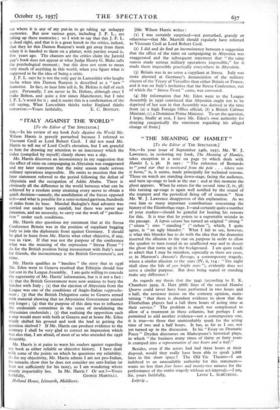"THE MEANING OF HAMLET"
[To the Editor of THE SPECTATOR.] SIR,—In your issue of September 24th, 1937, Mx. W. J. Lawrence, in reviewing my book, The Meaning of Hamlet, takes exception to a note on page 70 which deals with Hamlet I, i, 36. It says : "The reference of Bernardo to " yond star that is westward from the pole . . . where now it burns," is, it seems, made principally for technical reasons. Those on watch are standing down-stage, facing the audience, and turn up-stage to look at the star : and at this moment the ghost appears. When he enters for the second time (I, iv, 38) this turning up-stage is again well notified by the sound of the trumpet and the periodical firing off of cannon." Now Mr. W. J. Lawrence disapproves of this explanation. As we owe him so many important contributions concerning the history of the Elizabethan stage, I—and certainly quite a number of your readers—should be grateful for hearing his reasons for this. It is true that he points to a regrettable mistake in the passage. A lapsus calami has turned an original " sitting " (" sitzen ") into " standing " (" stehen "), which, I quite agree, is "an ugly blunder." What I fail to see, however, is what this blunder has to do with the idea that the dramatist inserted the allusion to the star on purpose in order to allow the speaker to turn round in an unaffected way and to descry the ghost that turns up in the background. I am quite ready to admit that I may be mistaken, especially as there are cases, as in Marston's Antonio's Revenge, a contemporary tragedy, where a similar allusion to the stars (IV, ii, 114: "Ere night shall close the lids of yon bright stars "), evidently does not serve a similar purpose. But does being seated or standing make any difference ?
As regards my thesis that the 3942 (according to E. K. Chambers 3929, A. Hart 3668) lines of the second Hamlet Quarto could never have been performed in two hours and a half, the reviewer insists on the contrary opinion, main- taining "that there is abundant evidence to show that the Elizabethan players had a full three hours of acting time at their service." The problem is much too complicated to allow of a treatment in these columns, but perhaps I am permitted to add another evidence—not a contemporary one, it is true—to those that unmistakably speak for the acting time of two and a half hours. It has, as far as I see, not yet turned up in the discussion. In his "Essay on Dramatic Poesy" Dryden discourses on Shakespeare's historical plays, in which "the business many times of thirty or forty years is cramped into a representation of two hours and a half."
Besides, even if the actors had had three hours at their disposal, would they really have been able to speak 3,668 lines in this short space ? The Old Vic Theatre—I am indebted to an unassailable authority for this statement— wants no less than four hours and twenty-two minutes for the performance of the entire tragedy without act-intervals.—I am,






















































 Previous page
Previous page